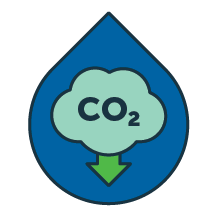Renewable Diesel is an ultra-high Cetane number hydrocarbon renewable fuel.
 |
Stringent quality standards that exceed ASTM, CEN and CGSB specification requirements |
 |
Lower Carbon Intensity (CI) allows for emissions solutions today |
 |
Compared to petroleum diesel, Renewable Diesel can reduce engine emissions by:
+ Up to 100% for fossil carbon1
+ Up to 30% for particulate matter2
+ Approximately 15% for nitrogen oxides (NOx)2
|
1 Product is produced from renewable oils and fats. Methanol used to make biodiesel and hydrogen used to make renewable diesel and SAF are typically made from conventional natural gas, but can be produced from renewable resources
2 CARB Assessment of the Emissions from the Use of Biodiesel as a Motor Vehicle Fuel in California "Biodiesel Characterization and NOx Mitigation Study." Durbin (2011)
For more information, download Chevron's Renewable Diesel fact sheet.
Download
Get Chevron's Renewable Diesel SDS.
Our focus is on your success.
For more than 25 years, we've helped industries implement practical solutions to complex sustainability challenges by providing leading-edge quality, go-to-market agility, sustainable partnerships and sensible decarbonization strategies.
Request More Information
To get product information, please submit the form below and a Chevron representative will be in touch shortly.